Have you ever seen your granny chasing after a doctor or a pharmacy? There are thousands of amazing natural remedies for burns, cuts, colds, fevers, sneezes, and other diseases all around us. Indian Herbal Plants and their uses are a must-have in your life because you never know when you will need them.
Our grandparents did not keep herbal plants at home. Even today, as our forefathers conserved Ayurvedic tradition, we are beginning to realize the negative effects of chemicals and turning back towards it. For illnesses such as fevers, colds, cuts, and burns, natural medicines are a gold mine.
It is reasonable to assume that using herbal plants as medicine is not a new concept. Indians have been using plant remedies for centuries that are still highly relevant today.
Herbal plant cures have no adverse effects since they are in harmony with nature. When these plants arrive at your home, you do not need to spend a lot of money. When compared to a box of prescription medications, these plants are relatively inexpensive.
The leaves, bark, seeds, or any other part of these herbal plants can be eaten by anyone of any age. In order to create a sustainable solution, herbal plants and medicinal plants can be used.
Indian Herbal Plants and their Uses
- Amla
An important rejuvenating herbal plants in Ayurveda, amala boosts the immune system and has great antioxidant properties. Here are some of the benefits.
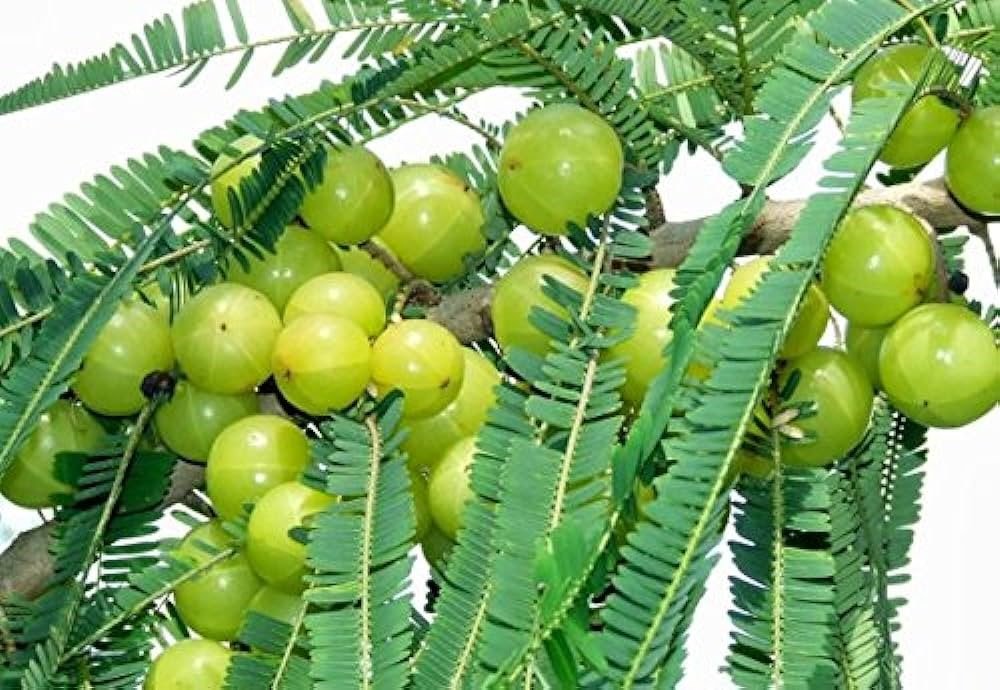
Benefits
- Vitamin C content is exceptionally high
- Enhances immune function, skin health, and overall vitality
- Promotes healthy bowel movements, reduces acidity, and supports liver function
- Treats inflammation-related conditions
- Promotes healthy circulation, regulates cholesterol levels, and supports heart health
- Reduces complications associated with diabetes by managing blood sugar levels
- Hair oils and skin care products contain this ingredient to promote hair growth, strengthen hair, and improve the texture of the skin
- Lowers the likelihood of cataracts and age-related macular degeneration.
- Treats respiratory conditions such as coughs, bronchitis, and asthma
- Protection of cells and tissues from premature aging contributes to healthy aging
- Calcium and minerals are important for bone health
- Osteoporosis prevention
- Prevents premature greying of hair
- Enhances the pigmentation of natural hair
2. Tulsi

Benefits
- Four varieties of tulsi are identified in Ayurvedic texts: Rama, Krishna, Vana, and Kapoor.
- Over the centuries, Tulsi (the queen of herbs) has been renowned for its healing properties.
- Herbal tea is made from tulsi.
- Oil extracted from Karpoora Tulsi is commonly used in herbal toiletries. Its oil is also used to treat insects and germs.
- Most often, tulsi is utilized in herbal toiletries. Its oil is also used to combat germs and insects.
- There is no doubt that Rama Tulsi is an effective remedy for Severe Acute Respiratory Syndrome. Its leaves are consumed for the relief of colds, fevers, bronchitis, and coughs.
- The oil of tulsi can also be used as an ear drop.
- Malaria can be cured with tulsi.
- Indigestion, headaches, hysteria, insomnia, and cholera can all be treated effectively with this herbal plants.
- Millions of people take Tulsi leaves every day.
- Various physical and medicinal properties are said to be associated with Tulsi beads, which are worn by many people.
3. Ashwagandha
Ashwagandha, a traditional ayurvedic medicine, is known for its diverse uses and can be found in regions such as India, Africa, and parts of the Mediterranean. Its name is derived from the Sanskrit words “ashva” meaning horse and “gandha” meaning smell.
According to tradition, it has the ability to increase strength and stamina while nourishing both male and female reproductive and nervous systems. It also goes by names such as “Winter Cherry” or “Indian ginseng” and is primarily used in ayurvedic remedies made from its roots.
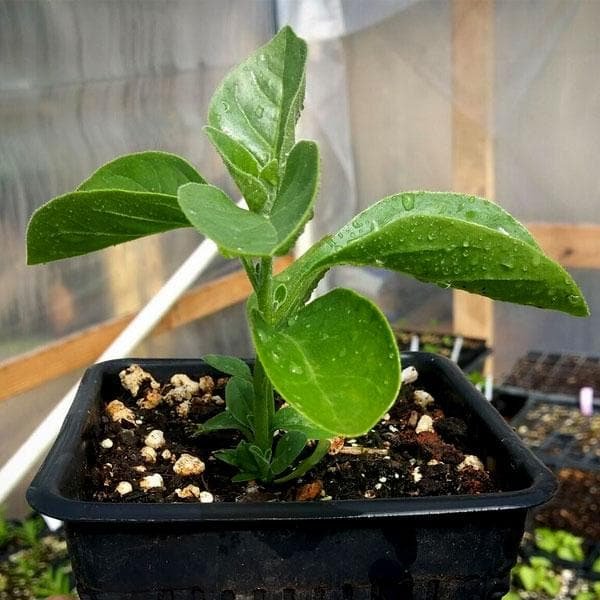
Benefits
- Adaptogenic herbal plants help the body cope with stress and maintain balance
- Calms the nervous system
- Relaxes
- Stress and anxiety are managed
- Enhances energy, stamina, and vitality
- The body’s natural defense mechanisms are enhanced by immune-modulating properties
- Inflammation-related conditions are reduced
- Enhances cognitive function, memory, and focus
- Aphrodisiac
- Balances hormones in a positive way
- Enhances muscle strength, endurance, and recovery in athletes
- Calcium and minerals support bone health
- Maintains blood sugar levels
- Compounds with anti-cancer properties exist
4. Aloe Vera
Although it tastes like a turd, aloe vera is still edible. The sap from aloe vera is extremely useful to speed up the healing and reduce the risk of infection for:

Benefits
- Injuries
- Reductions
- A burn
- Inflammation reduction
- Aloe vera is used externally on the skin as well as internally for:
- Aloe vera juice for ulcerative colitis
- Constipation for a long time
- Appetite problems
- Problems with digestion
5. Curry Tree
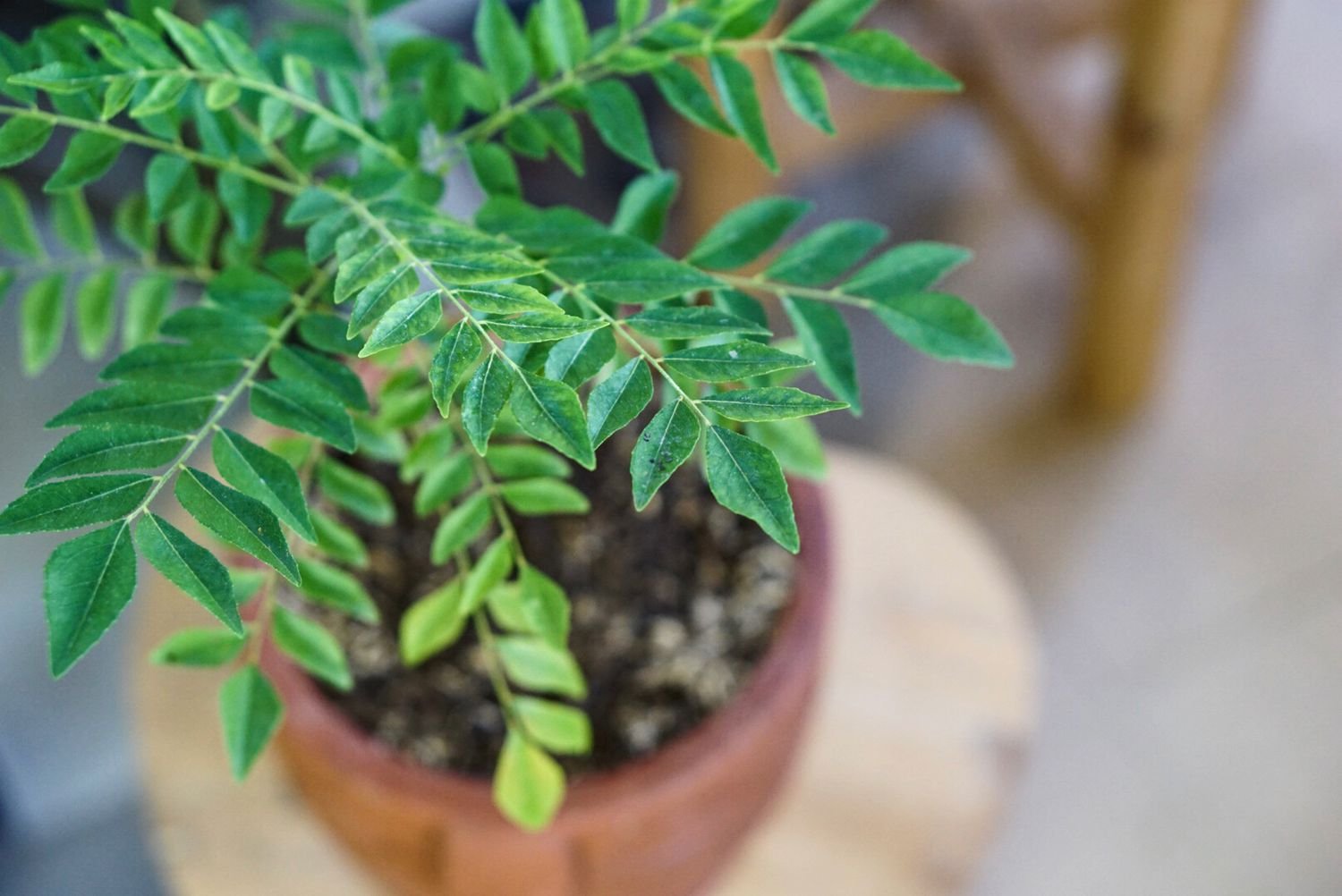
Benefits
- Digestive properties make it popular
- Supports diabetes management by regulating blood sugar levels
- Prevents cell damage caused by oxidative stress
- Inflammation-related conditions are reduced
- It is used in hair oils and treatments to promote hair growth, reduce hair loss, and improve hair health
- Controls cholesterol levels
- Supports metabolism and weight management
- Infections caused by bacteria and fungi are combated
- Diarrhoea and stomach upset are addressed
- Enhances eye health and vision
- Prevents cataracts
- Detoxifies the liver and supports liver function
- Manages skin disorders and improves skin health
6. Neem
Neem’s bitter flavor has contributed to its popularity. The word “neem” comes from the Sanskrit word “Nimba,” which means “bestower of health.” Neem is utilized in about 75% of Ayurvedic formulations and has remarkable healing properties for a variety of ailments.
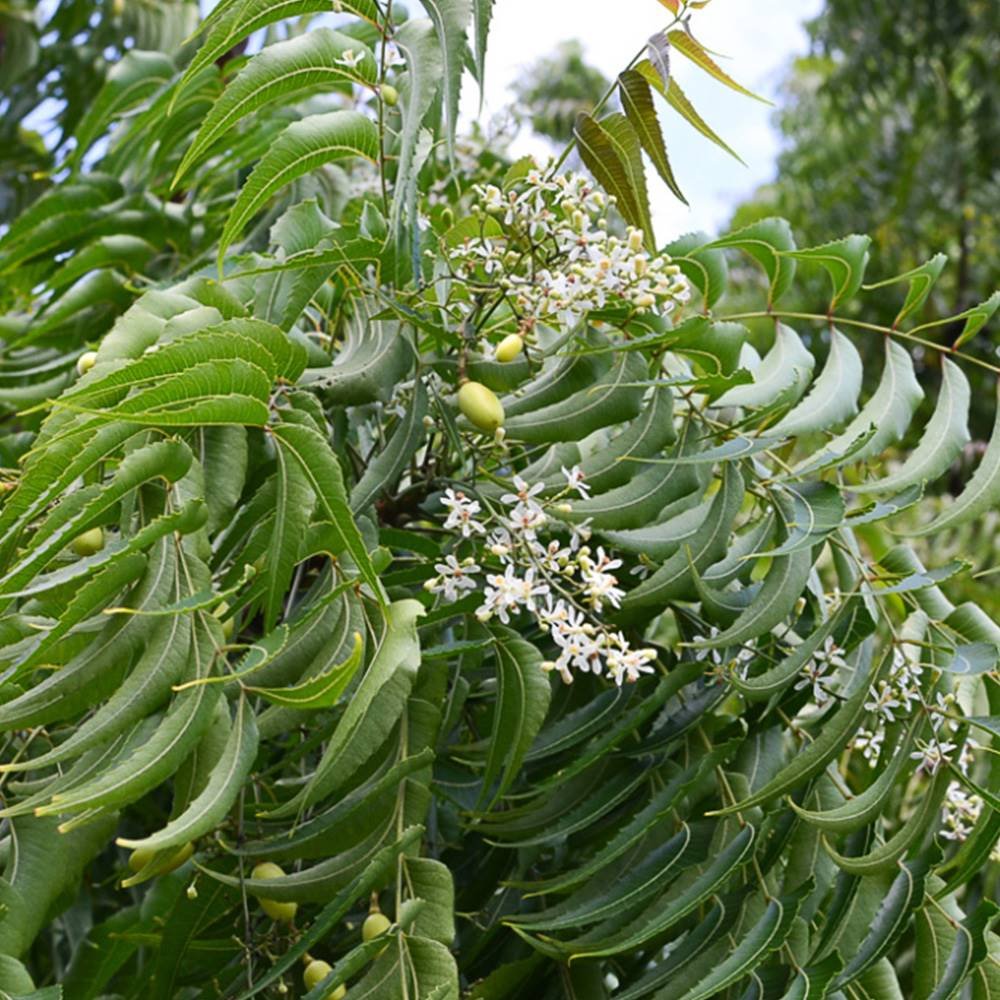
Benefits
- It is effective against a wide range of bacteria and infections
- Treats fungal skin infections, including athlete’s foot and ringworm.
- Infections caused by certain viruses are managed
- Defends cells against oxidative stress and free radical damage
- Inflammation is reduced and associated symptoms are alleviated
- A treatment for acne, eczema, psoriasis, and other skin conditions
- Gum disease and bad breath can be addressed with this product
- Immune system booster
- Maintains blood sugar levels
- Promotes healthy bowel movements and addresses digestive issues
- Malaria prevention and management
- It is known for its contraceptive properties
7. Lemon Grass
As an ingredient in Indian teas, lemongrass has a wide range of health benefits, according to Ayurveda.
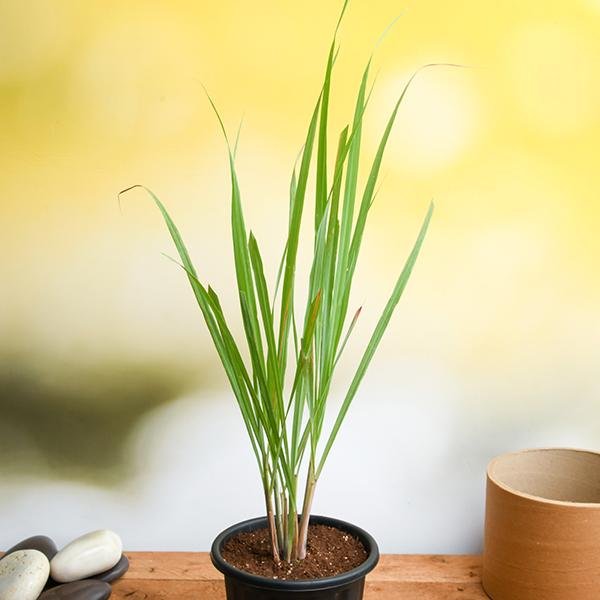
Benefits
- Aside from its excellent anti-cancer properties, it also relieves some respiratory conditions such as laryngitis and sore throats.
- Besides lowering a fever, it relieves headaches, abdominal pain, muscle pain, and joint pain.
- It is used in detox tea to help people lose weight and control nervous and stress-related conditions.
8. Tumeric
Turmeric is a spice from the ginger family that contains bioactive ingredients, which makes it antibacterial and has many other health benefits. It is often brilliant orange in color and has an earthy aroma and flavor.

Benefits
- Antioxidant properties are significant
- Ensures that brain disorders are less likely to occur
- Cardiovascular conditions are helped by it
- Hormone stability
- Immune system booster
- Reduces hair loss
- Turmeric can be used by anyone without risk.
9. Fenugreek
It is always a good idea to grow this plant at home. Both the seeds and the leaves are beneficial. Curry and paratha recipes often contain this Indian herbal plants.

Benefits
- Among its uses are poor digestion, bad breath, menstrual cramps, labour pain, and insufficient lactation.
- Furthermore, it lowers blood cholesterol, treats inflammation and stomach ulcers, drains sweat ducts, and improves indigestion and weight gain.
- Drain sweat ducts for bodybuilding and late-onset diabetes.
10. Marigold
As one of the most popular and beneficial herbal plants to grow at home is marigold. Marigold herbal plants are usually used as ornaments because of their bright and colorful blooms. However, they also have some wonderful therapeutic properties.

Benefits
- Minor cuts can be healed by the leaves of the marigold plant.
- Inflammatory bowel disease can be lessened by it.
- Haemorrhoids can be treated with it.
- Inflammation, conjunctivitis, and eye infections can all be treated with it.
Organic herbal plants and their applications have gained popularity as a result of the adverse side effects of modern pharmaceuticals. Its leaves, gel, oil, and flowers can be used for numerous health and cosmetic purposes by planting them near your home.
Many of these easy-to-grow herbal plants benefit your family as well as your garden, drawing beneficial insects like bees and preventing destructive pests from damaging neighbouring plants.


